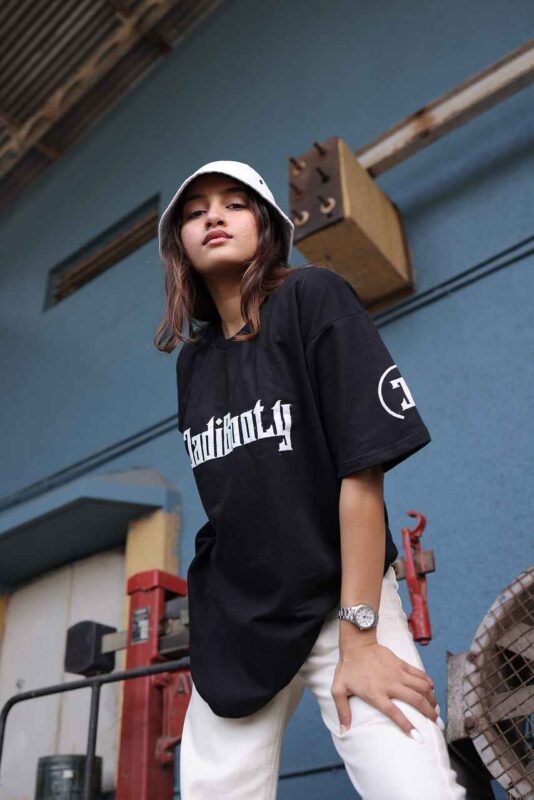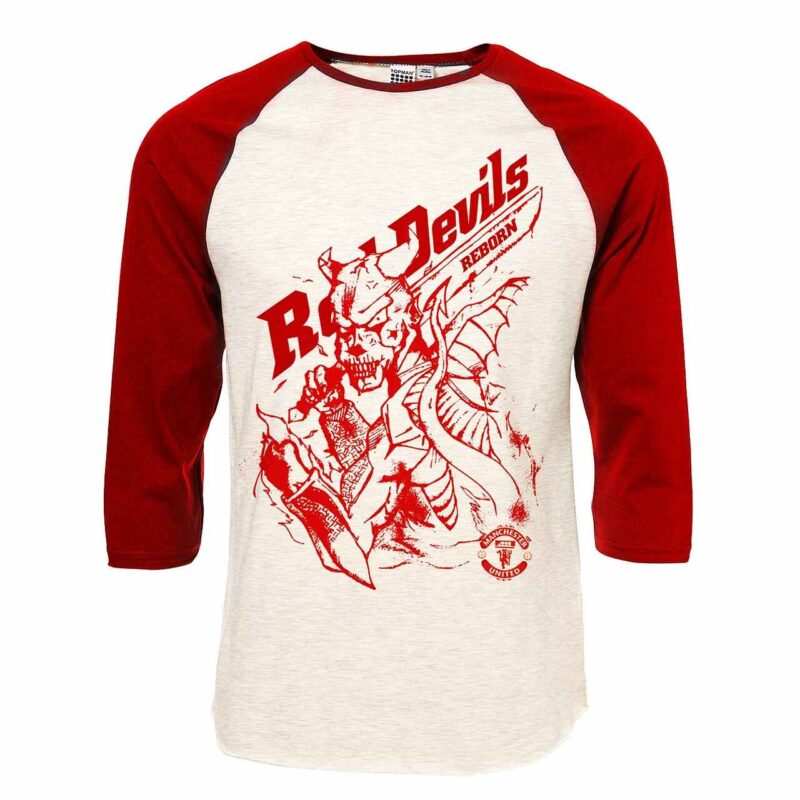Once upon a time, the idea of “green fashion” could have seemed like a passing trend—something niche companies performed to satisfy a limited audience of environmentally aware consumers. Everything has changed now. Sustainability is now a worldwide mentality, not a buzzword. From supermodels to regular consumers, everyone is discussing how to maintain comfort and style while minimizing their environmental impact. Is Sustainable T-Shirt Manufacturing Fashion’s Next Big Star?
But what about T-shirts?
Yes, that simple, seemingly ordinary garment we throw on without a second thought is actually taking center stage in the sustainability revolution. Why? Because T-shirts are ubiquitous—almost everyone, regardless of age or background, owns at least a couple. They’re the perfect canvas for experimenting with new, eco-friendly materials and production methods. If you can make a T-shirt both planet-friendly and high-quality, you’re effectively showcasing that “green fashion” can be more than a fancy label—it can be a comfortable, practical reality.
In this blog post, we’ll explore how T-Shirt Manufacturing has become a driving force behind this new wave of eco-chic. We’ll peek into the supply chain to see how even the smallest decisions—like picking the right kind of cotton or adopting water-saving dye techniques—can have a colossal impact. We’ll also discover why “quality” and “environmental responsibility” are no longer mutually exclusive but rather two sides of the same coin. And if you’re still skeptical, we’ll show you the data that proves sustainability isn’t just a fleeting trend. It’s here to stay—and T-shirt producers worldwide are ready to embrace it.
So, buckle up and get ready to find out why “eco” and “style” can (and should) go hand in hand. If you’ve ever wondered whether a basic tee could spark meaningful change, prepare to be amazed.
“Eco” vs. “Quality”: Who Says We Can’t Have Both? And Why Is Everyone Reluctant to Choose?
A long-standing fallacy in the fashion world has been “If it’s eco-friendly, it can’t be high quality.” On the other hand, “If it’s top-notch, it probably isn’t sustainable.” These misunderstandings create an unwarranted tug of war between two essential elements—premium workmanship and environmental responsibility.
But must it be a trade-off?
Certainly not! Indeed, market demand is progressively demonstrating that individuals want—and will pay for—both. “Green” doesn’t have to mean “cheaply made” whether it’s a recycled polyester tee that holds up to daily exercises or an organic cotton T-shirt that feels like a cloud on your skin. Advances in textile science and production techniques have helped us to finally lay this antiquated idea to rest.
So why do people still feel torn?
- Misconceptions: Many still assume that eco-friendly materials lack durability or comfort.
- Legacy Practices: Older production methods might have been less efficient or more expensive, reinforcing the myth that sustainability equals higher costs and lower output.
- Marketing Spin: Some brands use “green” labels as a mere publicity stunt, creating confusion about what genuine eco-quality actually looks like.
But times have changed. To produce clothes that compete, if not exceed, their traditional equivalents, Modern T-Shirt Manufacturing invests in ethical sourcing and cutting-edge technologies. More and more, you’ll come across T-shirts with strong stitching and a smooth finish as well as GOTS (Global Organic Textile Standard) or OEKO-TEX certifications. The lesson? You no longer have to give up comfort and style at the altar of sustainability. The two can coexist, and the market is calling for precisely that synergy.
Should your brand still be undecided, now is the moment to escape this false dichotomy. A T-shirt can be both luxuriously soft and responsibly manufactured. It all begins with the materials you select, as we will shortly investigate.

From the Ground Up: Can Fabric Choice Really Shape a T-Shirt’s “Green DNA”?
When you consider it, a T-shirt’s narrative starts much before it lands in your online buying basket or on the store rack. Starting in fields, labs, and recycling plants where raw materials are collected or repurposed, it starts. These raw ingredients are the “DNA” of a T-shirt, hence defining most of its environmental impact and performance once you wear it.
Organic Cotton, Recycled Polyester, Bamboo, or Hemp—Which One’s the Eco Hero?
- Organic Cotton: Grown without harmful pesticides, it preserves soil fertility and reduces toxic runoff. Many wearers also rave about its softness and breathability.
- Recycled Polyester (rPET): Reclaimed from plastic bottles or post-consumer waste, it saves billions of bottles from landfills. It’s durable, quick-drying, and a popular choice for athletic tees.
- Bamboo: Highly renewable and fast-growing, bamboo can be converted into a silky, antimicrobial fabric perfect for casual and athletic wear.
- Hemp: Another fast-growing crop, hemp requires minimal water and no pesticides. Its fibers are strong, making for durable T-shirts that get softer over time.
Verifying the Supply Chain
Verifying fabric suppliers is just as vital as looking at the nutrition label on a snack. Certifications such as GOTS guarantee that the whole cotton supply chain follows rigorous environmental and social standards. On the other hand, the Global Recycled Standard (GRS) confirms polyester-like fabric’s recycled material. For companies, boasting these accreditations can be a strong tool to confirm to customers that you are not only greenwashing.
The Power of a Good Story
Ever notice how consumers love a brand “story”? Showcasing the journey of your T-shirt from “farm to fashion” can boost its appeal. People get excited when they know the fibers of their tee were grown in a community-focused organic cotton farm or spun out of recycled plastic rescued from oceans. These narratives aren’t just fluff; they forge emotional connections. In a market saturated with disposable fast fashion, that emotional bond can be the key to standing out.
In the end, a T-shirt’s “green DNA” is about more than just looking good. It’s an opportunity to do good—from protecting agricultural workers to reducing landfill waste. So yes, fabric choice matters, and it can make or break your claims of true sustainability. Pick wisely, and you’ll lay a rock-solid foundation for an eco-friendly T-shirt that doesn’t skimp on quality.
Green Tech Unmasked: How Do We Ensure “Eco Targets” Go Beyond Buzzwords?
So, you’ve chosen organic cotton or rPET for your T-shirt line. High-five! But let’s not kid ourselves—sourcing eco-friendly fibers is only half the battle. The manufacturing process itself can make or break your T-shirt’s green credentials. From the moment the yarn gets spun to the final dyeing phase, each step carries the potential for cutting carbon footprints or creating pollution nightmares.
Energy-Efficient Spinning and Weaving
Step into a modern spinning facility, and you might be surprised at how high-tech it looks. Today’s machinery can run on reduced power, while advanced software optimizes thread tension and weaving patterns to minimize waste. Some factories even harness solar or wind power to further shrink their energy usage.
Dyeing and Printing: The Water Conundrum
Traditional dyeing can guzzle huge amounts of water. Enter new technologies like low-water or waterless dyeing systems, which slash consumption dramatically. Meanwhile, digital printing on fabric uses fewer resources than screen-printing setups and produces less wastewater. Not only do these processes help the planet, but they often yield more vibrant, lasting colors, too.
Waste Not, Want Not
Scraps and off-cuts are inevitable in sewing lines, but some T-shirt manufacturers have come up with inventive ways to repurpose them. From recycling leftover fabric into patchwork designs to converting scraps into insulation, zero-waste production is no longer a pipe dream. And what about leftover dye or water? Leading factories recycle and treat water so it can be reused multiple times—turning what was once a major pollution source into a more controlled loop.
Watchdogging the Supply Chain
Implementing green tech is all well and good, but how do you ensure that each supplier along the chain is equally committed? That’s where third-party audits and certifications come in. Factories might pursue ISO 14001 for environmental management or fair labor audits to confirm humane working conditions. These oversight measures shine a light on whether “green promises” align with actual practice.
In essence, going green in T-Shirt Manufacturing isn’t just about tapping into the right materials. It’s also about pioneering technologies that reduce water use, energy consumption, and waste. Only then can we confidently say our beloved tees aren’t just “talking the talk” but “walking the eco-friendly walk” from start to finish.
“Wearing Comfortable, Wearing Longer”: Can Sustainable T-Shirts Really Satisfy Such “Picky” Demands?
Some might scoff: “Sure, your T-shirt is eco-friendly, but will it feel good? Will it really last?” The assumption is that going green means compromising on either softness or durability. But thanks to textile innovation, sustainable T-shirts are proving the naysayers wrong—big time.
Testing for Comfort
Because the fibers are often more intact, having been less processed with harsh chemicals, high-quality organic cotton rivals or exceeds the comfort level of conventional cotton. Perfect for athletic or athleisure clothing, recycled polyester mixes can provide a silky-smooth feel and remarkable breathability. On the other hand, bamboo-based textiles are well known for their opulent drape and cooling effect on the skin.
Busting the “Not Durable” Myth
Eco-friendly isn’t synonymous with flimsy. Many natural fabrics, including hemp, can really be as tough as nails, softening with every wash while maintaining structural integrity. Recycled polyester, which is naturally durable, is the same. Manufacturing is the secret; regular stitching, strengthened seams, and rigorous quality controls guarantee your T-shirt can withstand daily use and frequent washing.
Lengthening Lifespan
A major reason sustainable garments often have a slightly higher price tag is that they’re built to last. Think about it: if your eco-friendly tee outlives three disposable T-shirts, you’re saving money over time and reducing environmental impact by cutting landfill waste. Brands that emphasize extended product life through quality craftsmanship send a strong message: sustainability is an investment, not a fleeting novelty.
Consumer Verdict
You don’t have to take the brand’s word for it. More and more shoppers are leaving rave reviews, sharing on social media how their “green” tees have stayed in top form even after months of regular use. This social proof is invaluable—when consumers see their peers championing these products, the old stigma of “eco = lesser” starts to crumble.
In short, a well-designed sustainable T-shirt can be the star of your closet: comfortable enough for everyday casual wear, durable enough for repeated laundering, and stylish enough to earn compliments. The “picky” demands of modern consumers? These garments are ready to meet and exceed them—all without laying waste to the environment.

Carbon Footprint and Social Responsibility: Are “Green T-Shirts” Just a Gimmick, or Do They Make Brands More Ethical?
“Sustainability” is more than simply the materials and production techniques; it also includes a brand’s larger footprint—environmental, social, and economic. Is starting a “green T-shirt” line just a clever PR strategy then? Or may it really show a deeper ethical position?
Cutting Emissions
Let’s discuss carbon footprints. T-Shirt Manufacturing may significantly lower its CO2 emissions by means of energy-efficient equipment, route optimization, order consolidation, and shipping route optimization. Some businesses put money into forestry projects or buy carbon offsets to go above and beyond. Although not a perfect solution, offsets show a desire to accept responsibility for people’s environmental effect.
Job Creation and Community
Imagine a factory that not only satisfies green criteria but also helps local healthcare and education programs. Employees have chances for professional development, safe working environments, and just pay. In this situation, making T-shirts is a driver for community growth not only about mass producing products. And indeed, customers see. A brand that prioritizes the welfare of its employees stands head and shoulders above others still ignoring sweatshop conditions.
Brand Image and Consumer Trust
In a market saturated with disposable, mass-produced clothing, having an ethical angle is more than just feel-good marketing. It can become your unique selling proposition. Customers increasingly want to know that their money is backing responsible enterprises. They’ll often seek out and remain loyal to brands whose values mirror their own.
Separate Reality from Gimmicks
Of course, some brands will try to “greenwash”—claiming to be environmentally friendly while making minimal real changes. That’s why transparency is paramount. Audits, certifications, and detailed reporting on everything from water usage to worker welfare can help brands prove they’re not just slapping an “eco” label on the same old practices.
In the end, adopting a sustainable approach to T-Shirt Manufacturing can indeed turn a brand into a more ethical player—provided the commitment is authentic and holistic. When a tee’s journey actively reduces carbon emissions, respects labor rights, and uplifts communities, it’s far more than just another product on the rack. It’s a statement about what fashion can (and should) be in a conscientious world.
Customization Craze: Can “Eco T-Shirts” Also Embrace Individuality and Trendiness?
We live in a golden age of personalization. From monogrammed phone cases to DIY sneakers, people want fashion that reflects their one-of-a-kind identity. But does customization have to clash with sustainability? Not if T-Shirt Manufacturing is flexible enough to accommodate small runs, unique prints, and zero-waste techniques.
Small-Batch, Big Impact
One of the biggest advantages of modern, eco-friendly factories is their ability to handle smaller, bespoke orders without sacrificing green standards. This approach often involves digital printing or laser-cutting technologies that reduce material waste. For instance, if you want a limited run of 200 T-shirts featuring an exclusive design, it’s now possible to do so responsibly, with minimal leftover fabric.
Digital Tools
Ever used an online design lab to customize a tee? Those same tools can integrate sustainability by letting you choose organic fabrics, safe printing inks, and packaging that’s recycled or biodegradable. And as you click “customize,” the system can calculate exactly how much material is needed, preventing oversupply and saving resources.
Trendy and Responsible
There’s a common misconception that sustainable equates to dull or shapeless. Modern T-shirt designs are smashing that perception, offering everything from slim-fit silhouettes to bold, fashion-forward prints. Pair that with “green” materials like Tencel or hemp, and you can achieve an upscale, runway-worthy look that’s lightyears away from the plain, boxy tees of yesteryear.
Meeting Diverse Consumer Tastes
From sportswear fanatics who crave performance fabrics to graphic-tee enthusiasts wanting brilliant colors, T-shirt manufacturers are increasingly equipped to meet diverse demands. Thanks to new textile and printing technologies, going green doesn’t limit your style palette. It expands it—because the environment itself becomes part of the brand’s storytelling.
In this customization-crazed era, “eco T-shirts” don’t have to feel behind the curve. On the contrary, they can be the hallmark of innovative design, offering a perfect marriage of personal expression and earth-friendly principles. Why settle for run-of-the-mill fast fashion when you can create (or buy) a tee that’s equally unique and responsible?
Modenly Recommendation: Why Does One-Stop Sustainable T-Shirt Manufacturing Give Your Brand a Head Start?
All this talk about sustainability, comfort, and style is exciting, right? But if you’re a brand looking to make a serious splash in the eco-friendly T-shirt arena, you need a manufacturing partner that can handle the complexities. Enter modenly: a one-stop solution poised to elevate your brand faster than you can say “organic cotton.”
Green Philosophy from the Get-Go
At modenly, every process incorporates sustainability; it is not an afterthought. Their supply chain, which you can proudly call eco-responsible, has been carefully selected from raw materials including GOTS-certified organic cotton to collaboration with companies using water-saving coloring techniques.
Show-Stopping Quality
We get it: no brand wants to risk subpar stitching or flimsy fabric, especially when they’re trying to make a statement. That’s why modenly invests in cutting-edge technology and rigorous quality control. You end up with T-shirts that feel luxuriously soft yet withstand countless washes—proving that “eco” and “premium” go hand in hand.
Flexible Order Sizes
Worried about placing a massive bulk order or dealing with complicated minimums? modenly offers the flexibility to handle everything from small custom runs to large-scale corporate demands. So whether you’re a burgeoning indie label or a well-established brand pivoting to sustainable lines, you’ll find a production setup tailored to your needs.
Holistic Service
Sustainability isn’t just about the shirt’s fabric. From design consultation to packaging solutions, modenly covers the entire journey. Want advice on label design made from recycled paper? Need help selecting the perfect shade of low-impact dye? They’ve got you covered, streamlining each step so you can focus on marketing and brand storytelling.
Ultimately, partnering with modenly gives you a trusted ally in the eco-fashion movement—one that understands the nitty-gritty details and helps you stay ahead of ever-evolving consumer demands. Ready to dial up your brand’s green credibility while wowing customers with top-notch tees? Contact modenly today and watch as “sustainability” becomes the secret sauce that sets your brand apart.
Market and Trends: Could Sustainable T-Shirts Become the New “Must-Have” Across the Globe?
Let’s talk big picture. Data from retail forecasts to consumer surveys consistently points to one conclusion: sustainability sells. And not just in a fringe, “hippie” way—major mainstream consumers are actively searching for green alternatives. Combine that with the universal appeal of T-shirts, and we’ve got a recipe for a worldwide wardrobe shake-up.
Numbers Don’t Lie
According to market research companies, the worldwide sustainable garment industry is expanding quickly, often faster than conventional fashion categories. People will pay more for goods they believe ethically created. This covers T-shirts, particularly given their daily use and possible wear-and-tear, which could lead more waste if created cheaply.
Big-Name Brand Shifts
Heavyweights in the business are starting or growing sustainable collections from Nike to H&M’s Conscious Collection. For inquisitive consumers, t-shirts are usually the gateway item, a cheap access point. The success of these lines emphasizes that sustainability is a significant influence in popular buying choices, not only for niche brands anymore.
Cross-Industry Collaborations
Ever see a coffee shop teaming up with a T-shirt brand to produce eco-friendly merch, or a tech giant unveiling staff uniforms made from recycled fibers? Collaborations between varied sectors are multiplying, further normalizing the idea that “sustainable tees” are a sign of forward-thinking. It’s a momentum that benefits the entire T-Shirt Manufacturing sphere, fueling more research into better materials and processes.
Future Outlook
As climate-conscious Gen Z gains more spending power, the appetite for ethical, planet-friendly clothing is set to intensify. Meanwhile, governments in many regions are introducing stricter environmental regulations, nudging (or pushing) businesses to adopt greener practices. All signs suggest that sustainable T-shirts won’t just be a trend. They’ll be the norm.
In short, if you’ve been doubting whether it’s worthwhile to invest in eco-forward T-shirt lines, let these market indicators serve as your wake-up call. We’re on the cusp of a green revolution, and T-shirts—humble though they may seem—could lead the charge.
Conclusion: When Eco Meets Quality, Are You Ready to Invest in Your Next “Green” T-Shirt?
You’ve traveled with us through the entire journey—seeing how sustainability can start with organic cotton farms or recycled PET pellets, move through cutting-edge production lines, and end up in your hands as a super-soft, durable T-shirt. We’ve debunked the myth that eco-conscious pieces must compromise on style or endurance. Instead, we’ve uncovered a world where “green” becomes a testament to excellence, innovation, and responsible stewardship.
Here’s the kicker: None of this matters unless we, as consumers and brands, decide to take the plunge. High-quality T-Shirt Manufacturing that respects people and the planet is more accessible now than ever before. From carbon footprint reduction to social responsibility, each step in the process can spark tangible change. The only question is: Will you be part of that change?
If you’re a brand on the hunt for an eco-savvy partner, remember that modenly stands ready to transform your vision into reality. Whether you’re seeking small-batch, custom tees or a large-scale launch, modenly’s comprehensive services can help ensure your garments live up to the green promise. And if you’re a discerning shopper, keep an eye out for those sustainability labels and brand stories—chances are, a whole lot of thought and innovation went into each stitch you see.
As we wrap up, imagine a not-so-distant future where every closet holds T-shirts that are not only stylish but also champion the environment. That future is taking shape today, and T-Shirt Manufacturing is right at the heart of it. So next time you reach for a tee, consider reaching for one that tells a greener, more responsible tale. After all, fashion is about more than looking good—it’s about doing good, too.

